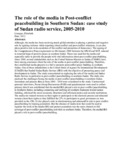| dc.description.abstract | Although, the media has been receiving much global attention in playing a partisan and negative role by igniting violence while reporting about conflict and post-conflict situations, it can also playa positive role in de-escalation of the conflict and promotion of democracy. The signing of the Comprehensive Peace Agreement on 9th January 2005 between the SPLM and NCP, ushered in renewed hope of positive peace in southern Sudan. There was need for the media and especially radio to provide the people with vital information about post-conflict peacebuilding.
Since 2005, several stakeholders such as the United Nations Mission in Sudan (UNMIS) have been raising awareness about the role of the media in post-conflict peacebuilding. Therefore, they established media projects in a bid to promote postconflict peace building in southern Sudan. One of these stakeholders is the United States of Agency for International Development (USAID) that funded Sudan Radio Service (SRS) with the objective of promoting peace and development in Sudan. The study concentrated on exploring the role of the media and Sudan Radio Service in particular in post-conflict peacebuilding in southern Sudan. The study also analysed the challenges facing the media in post-conflict peacebuilding in southern Sudan.
Secondary and primary data as from 2005 - 2010 were considered in the study. Unstructured personal interviews, Focus Group Discussions (FGD) and questionnaires were used to collect primary data.It was established that the medialSRS played a role in post-conflict peacebuilding in Southern Sudan; including connecting and unifying all southern Sudanese toward nation building, reformed the socio-economic structures and reformed justice and security institutions. The media too trained women on their rights to participate in the electoral process and educated women about their rights as they fulfilled the 25% to participate in good governance as was provided in the CPA.
It also played a role in electioneering and enhanced its role in post-conflict peacebuilding by training journalists. But the absence of media laws that could be used to regulate the work of the media/SRS and protect journalists was the main obstacle to full coverage of post-conflict peacebuilding activities in southern Sudan. Therefore, the medialSRS played a role in post-conflict peacebuilding. | en_US |

